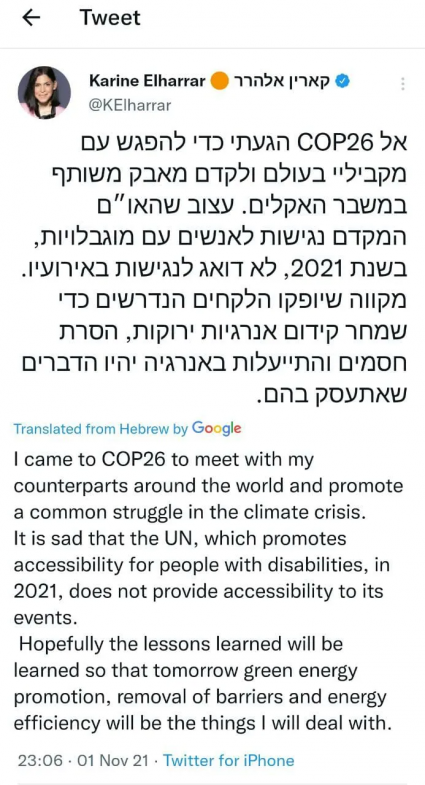Our Work
COP26 Climate Change Summit Inaccessible to Wheelchair Users
What it says about the intersection of disability rights and climate change
An Israeli cabinet minister who uses a wheelchair was unable to access the 2021 United Nations Climate Change Conference (COP26) climate summit in Glasgow. Shortly after encountering the inaccessible entrance, Karine Elharrar, Israel’s energy minister, tweeted:
“It’s sad that the United Nations, which promotes accessibility for people with disabilities, in 2021 doesn’t worry about accessibility at its own events.”
HPOD's Executive Director Professor Michael Ashley Stein commented on the incident for a news article published in The Hill:
“It’s of course unfortunate that [Elharrar] was left out … and it’s right that attention’s being paid to it, but what’s really more of an issue is the way people with disabilities have been left out of the climate change agenda and dialogue.”
He added, “Although we’re all going to suffer, and do suffer, from climate change, right now and in the future, the mortality rate for people with disabilities from natural disasters is as high as four times that of non-disabled persons.”
While some COP26 side events explored the intersection of disability and climate change, Minister Elharrar's exclusion underscores how persons with disabilities are too frequently sidelined from global climate change policy-making and natural disaster responses.
A pair of cases pending before the European Court of Human Rights casts in stark relief the disproportionate effects of climate change on persons with disabilities and older persons. Verein Klimaseniorinnen Schweiz & Others v. Switzerland was brought by a group of older women in Switzerland who allege that the state is not doing enough to cut greenhouse gas emissions. Switzerland's inaction consequently exposes them to life-threatening heatwaves in violation of the right to life and the right to private and family life enshrined in Articles 2 and 8 of the European Convention on Human Rights.
A similar case filed by an Austrian man with a temperature-dependent form of multiple sclerosis argues that the Austrian government's inability to effectively combat climate change violates his rights under Article 2 and 8 is pending.
For more on the intersection of disability and climate change, read this article published in The Lancet Global Health by HPOD associate Penelope J.S. Stein and Prof. Stein.


